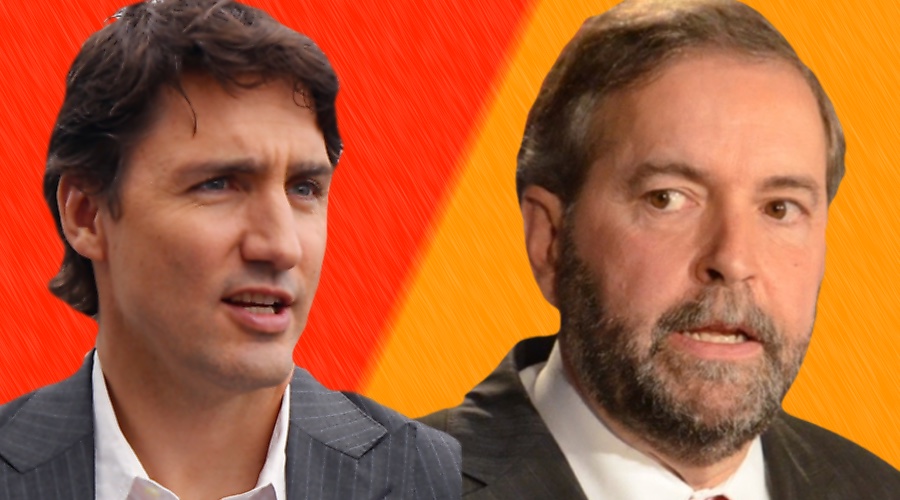Plays well with others. Every parent hopes for such a glowing assessment of his or her child. After all, to play well with others means your child is well-adjusted, open-minded, willing to compromise, able to share. Genuinely laudable qualities—and ones most kids master. If children can do it, why is it so hard for Justin Trudeau and Thomas Mulcair?
[related_content slugs=”canadians-real-winners-losers-macleans-debate,healing-canadas-ailing-democracy-starts-vote,decade-in-the-making-do-nothing-climate-plan-a-national-disgrace,when-the-facts-change-harper-ignores-them” description=”More from Kris Ade” position=”right”]A recent poll by Ipsos Reid found nearly two out of every three Canadians want to see the New Democrats and the Liberals form a coalition government to prevent the Conservatives from governing again if the election results in a hung parliament (which it almost certainly will be). In short, a majority of Canadians want Tom Mulcair and Justin Trudeau to play well together.
To his credit, Mulcair has said he would be open to a coalition arrangement with the Liberals. However, his contempt for Elizabeth May and future election debates run contrary to the spirit of cooperation and conciliation essential to building viable coalitions—especially ones in which the participation of the Greens may be essential to their success.
Trudeau has not minced words. “A formal coalition is out of the question,” he announced at a press conference in Winnipeg last month. Why? As he told the Canadian Press on Monday, he “does not believe in formal coalitions.” Why not? As he explained in late July, “there are a number of issues on which the Liberal party and the NDP disagree on a quite a fundamental level.”
On healthcare? On human rights? On climate change? On these, arguably fundamental issues the two parties are only distinguishable by degrees; in principle, they agree. Both parties also favour electoral reform and are equally apprehensive about international conflict. Both want to see more and better childcare options for families. Both support a robust, constructive response by the federal government to the Truth and Reconciliation Commission. Both are equally committed to basing public policy on sound evidence and research. Fundamentally, Canada’s Liberals and New Democrats occupy much of the same space on the political spectrum, competing against one another for the support of the country’s progressive voters.
What about the Sherbrooke Declaration? On this point, it is true, Tom Mulcair and Justin Trudeau do not see eye to eye. Then again, Stephen Harper and Peter Mackay disagreed on same-sex marriage and a woman’s right to choose and still managed to work together nonetheless.
In the last election, Quebecers roundly rejected the avowed separatist party in favour of federalist ones. They subsequently threw the province’s Parti Quebecois from office. Current polls put the Bloc Quebecois on course to winning zero seats. The threat of separation is at an historic nadir, thank goodness. Quebecers, like so many across Canada are far more concerned about those fundamental issues upon which Liberals and New Democrats agree than they are about esoteric ones upon which the two parties do not.
There is a certain irony to the parties’ intransigence. Their mutual desire to reform the electoral system would invariably entrench the necessity of coalition building in future parliaments. In the absence of electoral reform, the only way they will overcome the splitting of the progressive vote that prevents either of them from beating Stephen Harper would be a merger of their parties similar to the one taken by the Conservatives following a decade of vote splitting on the right side of the spectrum.
The stakes could not be higher and the consequences of their continued unwillingness to work together more serious: four more years of Stephen Harper.
In 2011, Stephen Harper’s Conservatives won 100 percent of the power with less than 40 percent of the country’s support. The same could happen again in October despite nearly two-thirds of Canadians preferring a progressive government to his regressive one. All because Tom and Justin cannot set aside their own naked ambition. To accuse them of being childish would be an insult to the countless children in sandboxes and on school playgrounds across Canada who play well with others. When will Tom Mulcair and Justin Trudeau do the same?
***
Kris Ade is a former political advisor, communications consultant, debate educator and trained chef. You can find him on Twitter at @krisade.
